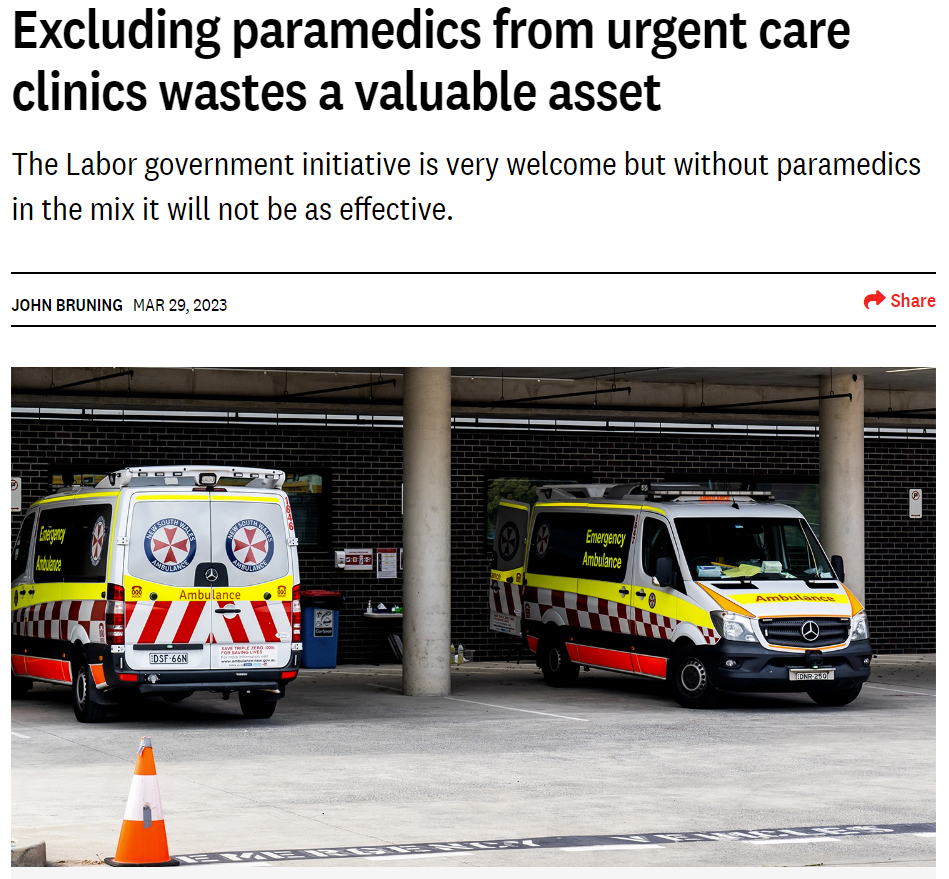In an op-ed published today on Crikey, College CEO John Bruning addresses the pressing need for paramedics to be included in the Federal Government’s multidisciplinary, team-based Urgent Care Clinics that are currently being rolled out across the country.

There’s been much recent media attention on the rollout of urgent care clinics (UCCs) across Australia as a panacea for the nation’s ailing health system.
In February, Health Minister Mark Butler announced the establishment of multiple UCCs comprising multidisciplinary teams that, theoretically at least, use a range of health workers spanning different professions as an innovative way to address the sectoral challenges nationwide.
There’s no doubt this is a welcome step forward and a much-needed initiative in expanding access to primary care, albeit on a fairly limited basis. However, much-needed reforms are still required across the health system, particularly for communities in regional and remote areas.
Critically, the continued omission of paramedics as part of those touted health teams, working alongside GPs, nurses and other health professionals, represents a missed opportunity for the government to realise the UCC model’s full potential.
We’re still short of detail on how UCCs will operate, but it’s clear “team-based care” is at the heart of the government’s vision as a way to remedy GP shortages, the pressures on hospitals and ambulance services, and the difficulties many communities have in accessing health services and healthcare professionals.
At the Australasian College of Paramedicine, of which I am the CEO, this is an approach we wholeheartedly support and have long advocated for. But where we differ with the government is in the narrow parameters that are being articulated in the proposed scope of those teams.
If we as a nation are serious about systemic change across the health sector, there must be broader understanding and recognition among national and state governments of the value and utility of paramedics as a primary health workforce.
The groundwork has already been laid by countries such as the UK and Canada, where paramedics are integrated as part of multidisciplinary health teams, and by progressive clinics in Australia and Aotearoa New Zealand, where their inclusion has resulted in improved and more timely health provision, a reduction in emergency department presentations and ambulance ramping, and less pressure on GPs, among other demonstrable benefits.
The same is true for the growing number of community paramedics working throughout the country to provide in-home care and longer-term support for patients who are better served by such out-of-hospital treatment options.
We have an opportunity to make this model of person-centred care a reality via the UCCs. Providing the space for paramedics to treat acute and urgent but non-life-threatening presentations in these clinics makes sense. It’s what they do each and every day. And more importantly, we know it works and benefits everyone within the health system and across communities — and economically. It’s a win-win for all Australians.
As we embark on what is shaping up to be a new era of healthcare, we urge the government to expand its well-intentioned vision and ensure that UCCs are operating to their full potential, with paramedics able to take their place alongside other health professions to deliver a more effective healthcare model.
To read the op-ed on Crikey, visit: https://www.crikey.com.au/2023/03/29/paramedics-excluded-urgent-care-clinics/

Get unlimited access to hundreds of ACP's top courses for your professional development.
Join Now